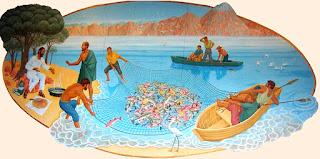Luke 13:10-17
Vision Problems
James Sledge August
21, 2022
Back in the 1960s, a student at Y
 |
|
James Tissot, 1836-1902,
Woman with an Infirmity of Eighteen
Years
|
ale
University wrote a term paper in which he proposed creating a company that used
a fleet of airplanes to deliver envelopes and small packages overnight. Parcels
would be picked up in the afternoon, whisked to the airport, flown to a central
location where they would be sorted, put back on airplanes, then flown to their
destinations to be delivered the next day.
His professor was unimpressed by the paper
and gave it a grade of C. Clearly the idea was impractical, and the cost would
be prohibitive. No way the market would support the cost of developing a small
airline for ferrying around letters and packages at night. And who would pay
the high price of getting mail to its destination a couple of days early?
Not too many years later, that student
founded Federal Express, now known as Fed Ex. In just over a decade, the
company had a billion dollars in revenue and was being copied by UPS and
others. The company was so successful and synonymous with overnight delivery
that people began to say, “I’ll fed ex that contract to you.”
I’ve often wondered if that Yale professor
ever reflected on the poor grade he gave that term paper. Did he wonder how he
had failed to see what an innovative idea it was? Did it make him wonder about
his own credibility as a professor?
History is littered with smart people,
experts in their field, who dismissed cars as a passing fad, television as a
ridiculous idea that could never compete with radio and the movies, or the
phone as little more than a novelty. It’s amusing to recall how badly these
experts missed in their predictions. How could they have gotten it so wrong?
It seems we humans have an impressive
ability to misjudge the future, to misjudge what will work and what won’t, to misjudge
where the world is really headed. Some of this is simply the limitation of
being human. We can’t see into the future, and so it’s no big surprise when
that we fail when we try.
But human limitations aside, we also fail
to see the future because of poor vision that causes us to miss what later seem
obvious signs of coming change. Our vision problems come from a trait we all
share to one degree or another. We tend to think that our understanding of how
things are is actually how they are and even how they should be. And so we’re
usually very slow to accept different views of things, different ideas of what
is possible, different ways of doing things. We label such things impractical,
unworkable, ill conceived, etc.
When Jesus showed up, proclaiming that the
day of God was drawing near, a day when the poor would be lifted up, justice
would be done, people would be healed, restored, and experience new life, lots
of people couldn’t see it. The problem was especially acute for religious
leaders who often saw Jesus and his ideas as disruptive, irreverent,
impractical, ill conceived, etc. Even when Jesus did amazing things in their
presence, they still couldn’t see it. Jesus just went against the grain too
much.















